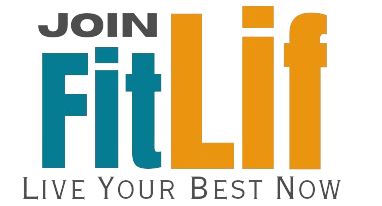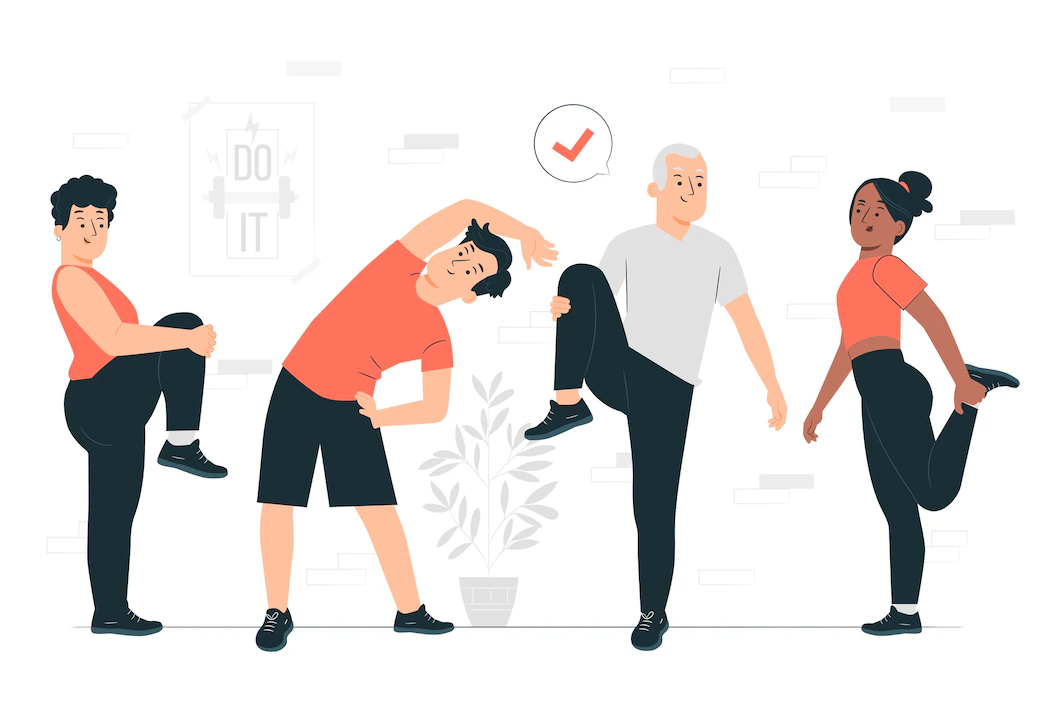Skip to content
- What is exercise?
- Exercise is any physical activity that gets your body moving and your heart rate up, like walking, jogging, or dancing.
- Why is exercise important?
- Exercise keeps your body healthy, helps you maintain a healthy weight, and boosts your mood.
- How often should I exercise?
- Aim for at least 150 minutes of moderate exercise or 75 minutes of vigorous exercise per week.
- What’s the difference between cardio and strength training?
- Cardio (aerobic) exercises like running improve your heart and lung health, while strength training builds muscle and makes you stronger.
- Can I lose weight just by exercising?
- Exercise helps, but you also need to eat a balanced diet to lose weight effectively.
- Is stretching important before exercise?
- Yes, stretching helps prevent injuries. Try dynamic stretches like leg swings or arm circles.
- When is the best time to exercise?
- The best time is when you feel most energetic, whether that’s morning, afternoon, or evening.
- Can I work out during pregnancy?
- Yes, but consult your doctor and choose safe, pregnancy-specific exercises.
- How can I stay motivated to exercise?
- Find activities you enjoy, set achievable goals, and buddy up with a friend.
- What’s a good workout routine for beginners?
- Start with a mix of cardio and strength exercises, like brisk walking and bodyweight exercises.
- How long should a workout be?
- Aim for 30-60 minutes, but shorter workouts can be effective too.
- What is HIIT?
- High-Intensity Interval Training (HIIT) alternates between intense bursts of exercise and short rest periods for a time-efficient workout.
- Can exercise help with stress?
- Yes, exercise releases endorphins, which can reduce stress and improve your mood.
- Should I exercise when I’m sick?
- If it’s a mild illness, light exercise can help, but rest if you have a fever or severe symptoms.
- How do I choose the right shoes for exercise?
- Pick shoes that fit well, provide support, and are designed for your specific activity.
- What are the best exercises for toning my abs?
- Planks, crunches, and bicycle crunches are great for working your core muscles.
- How do I know if I’m working out hard enough?
- You should feel your heart rate increase and break a sweat, but you should still be able to talk.
- Can I exercise with a chronic condition?
- In many cases, yes, but talk to your doctor and adjust your routine accordingly.
- What is cross-training?
- Cross-training mixes different types of exercise to keep things interesting and reduce the risk of overuse injuries.
- How do I avoid exercise-related injuries?
- Warm up, use proper form, and don’t push yourself too hard too quickly.
- What should I eat before and after a workout?
- Have a small meal with carbs and protein about 2-3 hours before, and a snack with protein and carbs afterward.
- How can I improve flexibility?
- Stretch regularly, holding each stretch for about 15-30 seconds.
- What’s the difference between flexibility and mobility?
- Flexibility is about muscle length, while mobility is the range of motion in your joints.
- Can I spot reduce fat with specific exercises?
- Unfortunately, no. Fat loss happens all over your body, not just in one area.
- What is functional fitness?
- Functional fitness focuses on exercises that help you perform everyday activities better.
- How long until I see results from exercise?
- Results vary, but you’ll start feeling better in a few weeks and see changes in a few months.
- How can I stay motivated to work out at home?
- Set a schedule, create a designated workout space, and try online workout classes.
- What is the “burn” sensation during exercise?
- It’s your muscles working hard and getting stronger.
- What is the target heart rate during exercise?
- Your target heart rate depends on your age and should be around 50-85% of your maximum heart rate.
- Is it better to exercise alone or with others?
- It depends on your preference. Some people find motivation in group classes, while others prefer solitude.
- How does exercise affect sleep?
- Exercise can improve sleep quality, but avoid vigorous workouts close to bedtime.
- Can I exercise without equipment?
- Absolutely! Bodyweight exercises like push-ups, squats, and lunges are effective.
- Can you exercise too much?
- Yes, overtraining can lead to fatigue and injury. Listen to your body and take rest days.
- What is periodization in training?
- Periodization involves changing your workout routine periodically to prevent plateaus and optimize results.
- Are there age-specific exercise recommendations?
- Yes, exercise recommendations can vary by age, so consider your fitness level and any age-related concerns.
- What’s the importance of rest days?
- Rest days allow your muscles to recover and reduce the risk of burnout and injury.
- Can I exercise while fasting?
- Yes, but start slowly and listen to your body. Stay hydrated.
- How do I track my fitness progress?
- Keep a workout journal, take photos, or use fitness apps to monitor your progress.
- What is plyometric training?
- Plyometric exercises involve jumping and explosive movements to improve power and agility.
- How can I exercise safely in hot weather?
- Stay hydrated, wear breathable clothing, and exercise during cooler parts of the day.
- Can I fit in exercise with a busy schedule?
- Yes, short, intense workouts or small bursts of activity can be effective.
- Are there any exercise myths to watch out for?
- Be cautious of myths like “spot reduction” or the idea that you need expensive equipment to get fit.
- How does stress affect exercise?
- Moderate exercise can reduce stress, but excessive stress can impact your performance and recovery.
- Do I need a personal trainer?
- A personal trainer can provide guidance and motivation, but it’s not essential for everyone.
- Is it safe to exercise in extreme cold?
- Exercise is safe in cold weather with proper clothing and precautions.
- How can I exercise on a budget?
- You can find affordable workout options like outdoor activities, home workouts, or community classes.
- What are the benefits of strength training?
- Strength training helps build muscle, increase metabolism, and improve overall strength and function.
- How do I start exercising after a long break?
- Begin slowly, and gradually increase intensity to avoid injuries

